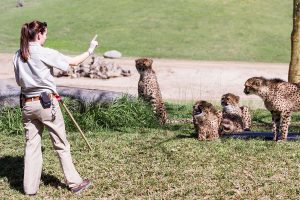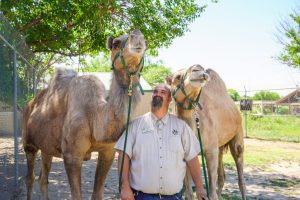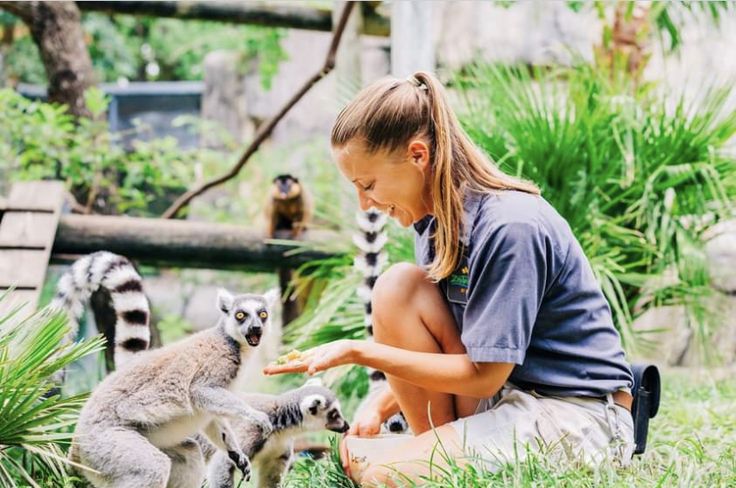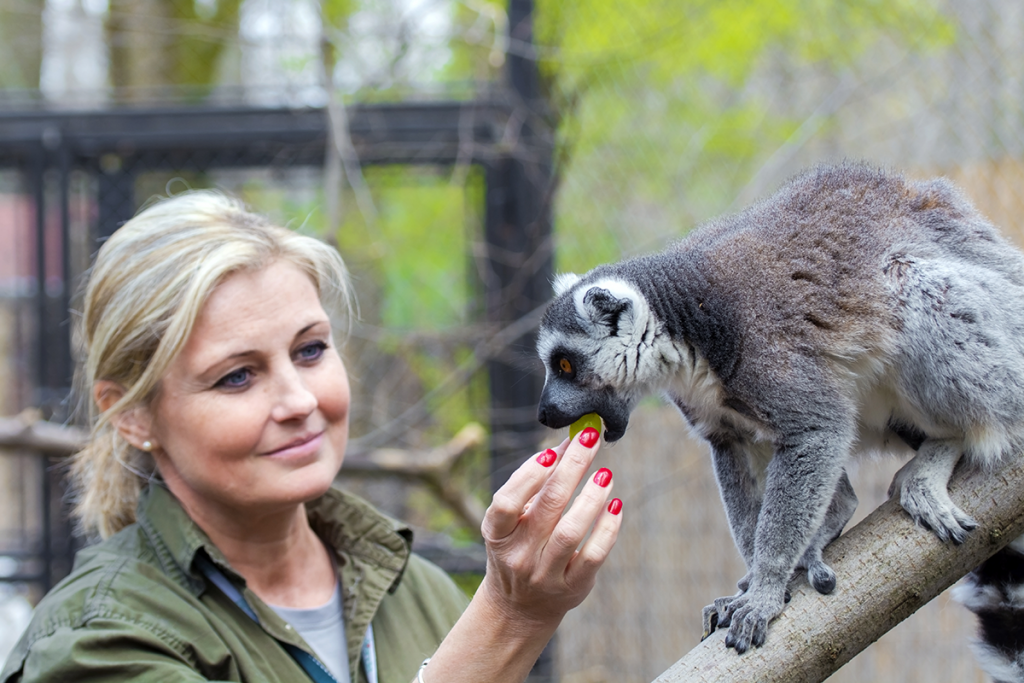To understand how to become a zookeeper, start by gaining hands-on experience with animals through volunteering or internships at wildlife parks, zoos, or veterinary clinics. Pursue relevant education in animal science, zoology, or veterinary care to build a strong knowledge base. Finally, seek specialised certifications and ongoing training to enhance your expertise and career opportunities in the field.
What Are the Main Types of Zookeepers?
Zookeepers focus on caring for and managing animals in a zoo, aquarium, or wildlife sanctuary. They often specialise in specific animals or tasks, depending on their interests and expertise. The main types of zookeepers include:
- Mammal Keeper: This role focuses on caring for large, complex animals such as bears, monkeys, big cats, and other hoofed creatures. Mammal keepers manage specialised environmental and nutritional needs for these animals.
- Bird Keeper: Bird keepers are responsible for species like parrots, raptors, ducks, and penguins. They assist with breeding and mating habits and work in aviaries that house these species.
- Reptile and Amphibian Keeper: This role involves working with snakes, lizards, frogs, turtles, and other reptiles and amphibians. Reptile keepers maintain habitats that require very specific conditions, such as high temperatures and humidity levels, and may work with venomous species.
- Aquarist (Fish and Marine Life Keeper): Aquarists manage fish and other aquatic creatures, including both marine and freshwater species. They are responsible for setting up and maintaining tanks, ensuring optimal water conditions, and feeding the animals.
- Invertebrate Keeper: Invertebrate keepers work with insects, spiders, and other arthropods. These animals often require carefully controlled environments, including specific lighting and humidity conditions.
- Large Animal Keeper: This role focuses on large mammals, such as elephants, rhinos, and giraffes. Large animal keepers manage the animals’ space, diet, enrichment, and safety, taking into account their size and behaviour.
- Veterinary Assistant Zookeeper: Veterinary assistant zookeepers support veterinarians in monitoring and treating animal illnesses. They may administer medication, assist during exams, and track the health of the animals.
- Behavioural Enrichment Specialist: Behavioural enrichment specialists design and implement activities that promote physical exercise and stimulate natural behaviours in animals. This role focuses on creating engaging environments and activities for animals to encourage full participation.
Each type of zookeeper works with unique species, requiring specialised knowledge in animal behaviour, nutrition, and habitat management.
What Does a Zookeeper Do?
The day-to-day responsibilities of a zookeeper can vary depending on their position, and the level of responsibility affects how much time and effort each task requires. Zookeepers care for, supervise, and feed the animals daily. The core responsibilities of any zookeeper include the following:

- Feeding and Nutrition: Zookeepers are responsible for providing animals with a balanced diet, tailored to their species’ specific nutritional needs. This ensures optimal growth, energy, and health. They monitor eating habits to detect any changes that could signal health issues. Proper nutrition is key to maintaining the animals’ overall well-being and preventing illnesses.
- Cleaning and Maintaining Enclosures: Zookeepers ensure that animal enclosures are kept clean, safe, and comfortable. They regularly clean habitats, change bedding, and remove waste to maintain hygiene. This helps reduce the risk of disease and keeps the environment suitable for the animals. They also ensure that all enclosures meet the specific needs of the species they house.
- Monitoring Animal Health: Zookeepers conduct regular health checks by observing animal behaviour and physical condition for signs of illness or injury. They note any changes in the animal’s health or activity and report concerns to veterinary staff. In some cases, they assist with administering medications or treatments. Early detection and swift action are crucial to maintaining animal health.
- Providing Enrichment Activities: Zookeepers provide enrichment activities to stimulate animals mentally and physically, mimicking natural behaviours. They offer toys, puzzles, and objects that encourage problem-solving and exploration. Enrichment activities help prevent boredom and stress in captive animals. This fosters better overall mental and emotional well-being for the animals in their care.
- Assisting with Veterinary Care: Zookeepers work closely with veterinary staff to assist in the treatment and care of sick or injured animals. They may help administer medication, assist with exams, and provide post-treatment care. Zookeepers are trained to recognise symptoms of illness and report them promptly. They also ensure that animals recover safely and that their treatments are followed correctly.
- Educating the Public: Many zookeepers engage with the public by conducting tours, talks, and demonstrations to raise awareness about animal care and conservation. They explain the significance of the species in the wild, their role in ecosystems, and the importance of conservation. Public education fosters understanding and appreciation for wildlife. It also encourages support for conservation initiatives and responsible animal care.
- Supporting Breeding Programs: Zookeepers assist with breeding programmes aimed at increasing the population of endangered species. They help manage mating pairs, track breeding success, and monitor the development of offspring. These programmes are critical to maintaining genetic diversity and preventing extinction. Zookeepers also support the release and rehabilitation of species back into their natural habitats where possible.
- Record-Keeping: Zookeepers keep detailed records of animal health, feeding schedules, behavioural observations, and enrichment activities. These records help track the progress of each animal and ensure their care is consistent and personalised. Documentation is also essential for medical treatments, breeding programmes, and regulatory compliance. It allows for better monitoring of each animal’s overall well-being.
Overall, the work of a zookeeper is essential for the conservation of animal life. Through high-quality animal care and public education, zookeepers play a vital role in wildlife preservation and species conservation.
Average Zookeeper Salary in the UK
Cossetting animals in a zoo is a rewarding yet challenging profession. While it is fulfilling, the average zookeeper’s salary tends to be lower than in many other professions. Salaries for zookeepers vary based on experience, location, and the specific type of zoo or wildlife facility. Below is a general overview:
- Beginner Zookeepers or Zoo Attendants: Zookeepers with 3 to 5 years of experience can expect to earn between £30,000 and £35,000 per year. For those starting out or working part-time, salaries tend to range from £8,000 to £12,000 annually, depending on their level of experience.
- Experienced Zookeepers: Depending on the type of facility and role, experienced zookeepers can earn up to £25,000. As they gain more experience and responsibility, there are opportunities for salary increases, potentially reaching up to £80,000 annually in senior roles.
- Head Zookeepers: Head zookeepers, who oversee teams and may specialise in certain areas, can earn salaries ranging from £35,000 to £45,000 per year, depending on the region and the specific demands of their role. In areas where this position is rarer, salaries may be on the higher end of the scale.
- Overseas Programs and Conservation: Zookeepers must hold varying degrees of certification depending on the region in which they work. These certifications influence the salary structure, as specific centres may focus on exotic species, veterinary care, or supporting women in conservation roles.
Essential Skills of a Zookeeper
Successful zookeepers require a combination of practical, technical, and interpersonal skills. Key skills required for a zookeeper include:

- Animal Care and Handling Skills: A strong understanding of animal care, behavior, and handling techniques is essential for working safely and effectively with a variety of species.
- Education and Experience: A strong understanding of animal behaviour, care, and handling techniques is essential in zookeeping. Practical experience is also crucial, as zookeepers often perform physically demanding tasks in outdoor environments.
- Observation Skills: Zookeepers must be highly observant, as even minor changes in an animal’s behaviour or appearance may indicate that it is unwell. Early detection of issues can be vital for timely medical intervention.
- Communication Skills: Effective communication skills are necessary for educating the public and collaborating with colleagues, including veterinary staff. Zookeepers need to be able to clearly convey information about animal care, conservation, and welfare.
- Attention to Detail: Zookeepers must pay close attention to detail in all aspects of their work, including record-keeping, feeding, and cleaning. Accurate documentation is essential for tracking the animals’ health and ensuring that care protocols are followed.
- Patience and Compassion: Zookeepers need both patience and compassion when working with animals. Building trust with animals and understanding their unique needs takes time and a compassionate approach.
- Problem-Solving Abilities: Zookeepers often face situations where quick decision-making is necessary, such as when dealing with animal aggression or emergencies. Strong problem-solving skills are crucial for managing these challenges effectively.
Zookeeper Tips
The following are some important pointers to ensure your success as a zookeeper:
- Gain Hands-On Experience with Animals: Gaining experience through volunteering or interning at wildlife parks, animal shelters, or veterinary clinics is invaluable. Working with animals in real-world settings helps build your skills. This hands-on experience is essential for understanding animal behaviour and care. The more practical exposure you get, the more prepared you will be for the job.
- Develop a Specialty: If you’re passionate about specific animals, like reptiles or marine life, focus on that area. Specialising allows you to deepen your knowledge and become an expert. It can make you a more competitive candidate for specialised roles. Over time, you can narrow your studies to match your interests and career goals.
- Maintain an Active Lifestyle: Zookeeping involves physically demanding work, including lifting, cleaning, and animal care tasks. Maintaining good physical fitness helps you manage the physical demands of the job. Staying active will improve your stamina and endurance for long hours outdoors. Physical strength is crucial for working with large or heavy animals.
- Engage in Ongoing Learning: Attend workshops, seminars, and training programmes to stay updated on best practices. Constant learning improves your understanding of animal behaviour, care, and conservation. It also helps you adopt new methods in animal husbandry and zoo management. Keeping your knowledge fresh will ensure you’re always advancing in your career.
- Establish Working Relationships with Professionals: Networking with veterinarians, conservationists, and other animal care professionals opens doors. Strong professional relationships can provide guidance, mentorship, and career opportunities. Collaborating with experts in the field enhances your knowledge and experience. Building a network helps you stay informed about industry trends and best practices.
- Be Prepared to Work in Different Conditions: Zookeepers often work outdoors, regardless of the weather, so proper gear is essential. You’ll encounter various conditions, from extreme heat to cold or rain. Being prepared with appropriate clothing and equipment is key to performing your duties efficiently. Adapting to changing environments is part of the job.
- Demonstrate Kindness and Understanding: Building trust with animals requires patience, empathy, and understanding. Zookeepers must recognise the unique behaviours and needs of each species. Developing a compassionate approach ensures the animals feel safe and cared for. This is crucial for providing quality care and ensuring the animals’ well-being.
Zookeeper’s Qualifications
Most zookeeper positions are filled by individuals who undergo training, education, and practical work. All of these are essential for start a career as a zookeeper:

- Academic Qualifications: Taking courses in animal science, zoology, biology, or other related fields is ideal, as most positions require a degree or diploma. Some zoos also hire individuals with diplomas in animal management or veterinary degrees. A strong academic background provides the foundational knowledge necessary for zookeeping.
- Hands-on Experience: Gaining practical experience is crucial in this field. Volunteering, working at a zoo, wildlife park, veterinary clinic, or completing internships helps you acquire the necessary skills. The more time spent in direct animal care, the better prepared you’ll be for the job. This experience is invaluable in understanding animal behaviour and care.
- Specialised Certifications: Positions involving dangerous or exotic animals may require additional certifications, such as animal handling or first aid. These qualifications ensure that you can safely work with these animals and handle emergencies. Specialised certifications can open up more career opportunities in specific areas of animal care. They are often a requirement for advanced roles in the field.
- Physical Fitness: Good health is essential for effective performance in zookeeping, as the job requires significant physical exertion. Many tasks, such as lifting heavy items or working outdoors, demand both strength and stamina. Maintaining physical fitness will help you manage the physical demands of the role. Strong endurance is necessary for working with large or challenging animals.
How to Become a Zookeeper
Step-by-Step Guide to Becoming a Zookeeper: How to Begin the Journey

- Gain Animal Care Experience: Animal shelters, wildlife parks, and veterinary clinics often allow people to volunteer or work without any specific prerequisites. This hands-on experience will help you gain your first field experience and provide a foundation in animal care.
- Complete Relevant Education: Earning a degree in animal management or a related field is advantageous, as employers typically seek individuals with expertise in animal care. Related subjects include agricultural sciences, biology, and veterinary science. Additional diplomas in animal care or veterinary qualifications may also be beneficial.
- Apply for Internships or Entry-Level Positions: There are many internship opportunities available, so it’s important to seek out local zookeeping or wildlife conservation organisations. Internships allow you to gain practical experience in animal handling under the guidance of experienced zookeepers, which is essential for advancing in the field.
- Obtain Specialised Training and Certifications: There are numerous areas for growth based on your interests. For example, if you want to work with large animals like horses, you may need specific training or certifications in animal handling. Additional certifications such as first aid or safety officer training are also valuable in this field.
- Form a Network of Animal Care Specialists: Building professional connections with veterinarians, conservationists, and other zookeepers can expand your career opportunities. Networking is an excellent way to learn from others, seek guidance, and stay informed about job openings in the field.
- Inquire About Zookeeper Jobs: After acquiring the necessary education, experience, and certifications, actively look for job opportunities that match your interests. When applying, make sure your CV and cover letter highlight your education, hands-on experience, and any relevant certifications.
- Engage in Continued Learning: To stay current in the field, attend workshops, seminars, and conferences on animal care, conservation, and zookeeping practices. Ongoing professional development will help you stay up-to-date with the latest advancements in animal husbandry and wildlife management.
Get Qualified as a Zookeeper
Online Animal Care Course, Essential Animal Care Practices, Animal Care Diploma, Veterinary Assistant Online Course
Frequently Asked Questions
Why Should You Be a Zookeeper?
Choosing a career as a zookeeper allows you to work directly with animals while contributing to wildlife conservation efforts. You also have the opportunity to educate the public about animal husbandry and the importance of protecting ecosystems. It’s an ideal career for those passionate about caring for animals and committed to conserving their habitats.
Is it Suitable to Work as a Zookeeper?
A career as a zookeeper could suit you if you have a genuine love for animals, can handle physically demanding work, and are dedicated to supporting conservation efforts. The role requires patience, resilience, and a deep commitment to animal welfare. For those devoted to animal care, these challenges are part of the rewarding experience.
What Are the Salary Ranges for Zookeepers?
The salary range for zookeepers typically falls between £30,000 and £40,000 per year. Those who specialise in a specific area can earn upwards of £30,000. Senior zookeepers or developing specialists can expect to earn between £20,000 and £30,000 annually. Entry-level zookeepers or those with less experience usually earn between £16,000 and £20,000. Salaries can vary depending on location, skills, and experience.
Which Qualifications Can Assist in the Pursuit of Becoming a Zookeeper?
A degree or diploma in zoology, animal science, or biology is highly advantageous for anyone aspiring to become a zookeeper, as it provides a solid foundation in animal care and behaviour. In addition, internships, volunteer work, and apprenticeships offer valuable practical experience that can greatly enhance a candidate’s career prospects. Certificates in animal handling or first aid are also beneficial and can open up more job opportunities.
Do I Need to Be Experienced to Get Started?
Yes, gaining hands-on experience with animals is crucial. Many aspiring zookeepers start by volunteering at animal shelters, wildlife parks, or zoos to gain practical skills and knowledge. This experience helps develop the ability to manage and care for animals effectively, making it easier to transition into a full-time zookeeping role.
What Is the Job Outlook for Zookeepers?
The demand for zookeepers is rising due to an increasing focus on wildlife conservation and the protection of endangered species. While the competition for positions can be fierce, zookeepers with experience in specialised areas, such as working with endangered species or conservation programmes, are highly sought after and often have better career opportunities.


